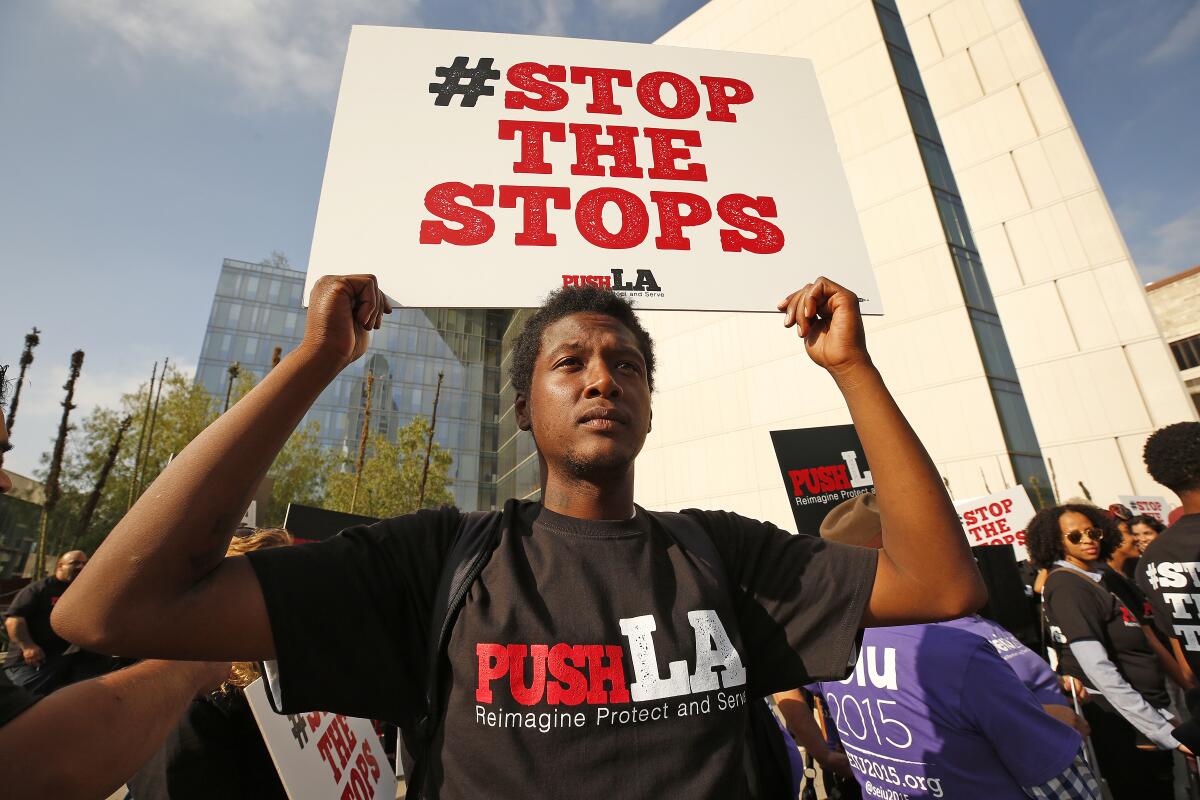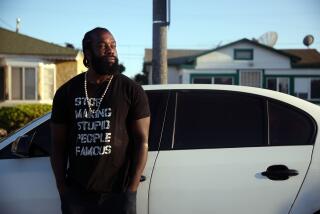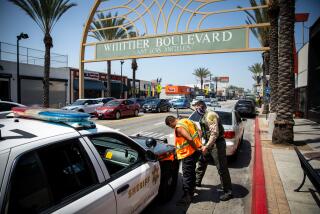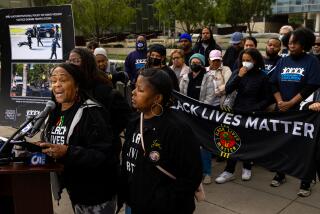In response to Times analysis, community groups call on LAPD to cut back on traffic stops

In response to a Times analysis showing that Los Angeles police officers search black and Latino motorists far more often than whites, a coalition of community groups is calling for the LAPD to drastically scale back on traffic stops.
The PUSH LA coalition, which includes Blacks Lives Matter, the ACLU of Southern California and other local groups, wants an immediate moratorium on pretextual stops, in which officers use a minor violation such as a broken taillight to stop a vehicle and look for more serious wrongdoing.
The coalition also is calling for the LAPD to admit that it has engaged in racial profiling, to apologize to people who have been unlawfully stopped and searched, to offer financial reparations and to fire problem officers.
The demands were outlined in a letter sent to Mayor Eric Garcetti and LAPD Chief Michel Moore on Wednesday. The letter repeated an earlier call for the LAPD’s elite Metropolitan Division to withdraw from South L.A., which had come from some coalition members in January after an earlier Times analysis showed that Metro disproportionately stops black drivers.
At a rally Wednesday in front of the LAPD’s downtown headquarters, where dozens of supporters held signs reading “Stop the Stops,” speakers said the Times analysis illuminated the indignities suffered by L.A. residents who feel targeted by police because of their race.
“We are here to call out the contradiction that white people can drive along in this city without any real fear of the police, while black and brown folks cannot,” said Alberto Retana, president and CEO of Community Coalition, a South L.A. group that pushes for grass-roots change.
The Times analysis, published online Tuesday morning, was the first in a decade to calculate racial breakdowns of searches and other actions by LAPD officers after they pull over vehicles.
Beginning in July 2018, LAPD officers were required to collect detailed information about every traffic stop under a new state law targeting racial profiling.
Citywide, 24% of black drivers and passengers were searched, compared with 16% of Latinos and 5% of whites, during a recent 10-month period, the Times analysis found.
That means a black person in a vehicle was more than four times as likely to be searched by police as a white person, and a Latino was three times as likely.
Yet whites were found with drugs, weapons or other contraband in 20% of searches, compared with 17% for blacks and 16% for Latinos. The totals include both searches of the vehicles and pat-down searches of the occupants.
The Times analysis found racial disparities in stops based on equipment violations such as a broken taillight or tinted windows, which can be the basis for pretextual stops. Twenty percent of traffic stops involving blacks and Latinos were for equipment violations, compared with 11% of stops involving whites.
Blacks and Latinos were more than three times as likely as whites to be removed from the vehicle and twice as likely to either be handcuffed or detained at the curb, the Times analysis found.
About 3% of blacks and Latinos stopped by the LAPD were arrested, compared with 2% of whites.
Racial disparities in stops and searches do not necessarily indicate bias and could reflect difference in driving behavior, neighborhood crime rates and other factors.
But criminologists said the lower contraband hit rates for blacks and Latinos raise serious questions about the law enforcement justification for searching them more often than whites.
A spokeswoman for Garcetti said his office is reviewing the letter from the PUSH LA coalition and “will press forward in the work of making certain that our police department earns the trust of Angelenos in every community, every day.”
Moore said he is aware that disparate enforcement of traffic stops can erode public trust. He pointed to a reduction in traffic stops since Garcetti ordered the department to scale back on stops in response to the earlier Times analysis and the call from community groups to withdraw Metro.
Through August, the number of vehicle stops performed by the LAPD was down 11% compared with the same period last year, and vehicle stops by Metro were down 45%.
Moore said he will soon announce changes to Metro, which could include switching to marked patrol cars.
He noted in a written statement Wednesday that Metro’s crime suppression units will focus on targeting “specific dangerous criminals while engaging in more substantive community outreach, thereby reducing our reliance on investigative stops.”
The LAPD has formed a working group to study stop-and-search data, with the goal of understanding differences across races, neighborhoods and officers in various assignments, Moore said in the statement.
“We believe this comprehensive approach will provide us insight into the cumulative effects of our law enforcement efforts and help us more effectively deploy resources in communities that feel over-policed,” the statement said. “The success of this strategy relies on constant communication with those who are impacted most by street violence. As we do today, we will incorporate their feedback into our enforcement posture.”
More to Read
Sign up for Essential California
The most important California stories and recommendations in your inbox every morning.
You may occasionally receive promotional content from the Los Angeles Times.











